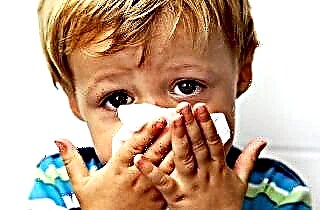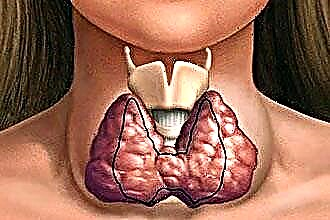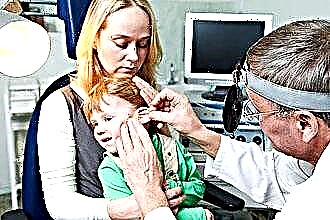Breastfeeding is very important for a developing child, because it contains all the most useful and nutritious. However, the quality of milk directly depends on the mother's diet and even her well-being. If a nursing mother catches a cold and uses medications, the composition of milk may change - even if these are common drops from a cold. We will tell you how to treat a runny nose during lactation in order to recover faster, and at the same time not reduce the beneficial properties of breast milk.
Some nasal preparations are absorbed into the bloodstream and have systemic effects that are often invisible to an adult. From the blood, these substances can pass into breast milk, and then into the baby's body. Thus, nursing mothers should be responsible when choosing a drug for the common cold.
Types of rhinitis and their treatment
 In most cases, what we call a runny nose, namely, the discharge of mucus from the nose and congestion, are symptoms of rhinitis, an inflammation of the nasal mucosa. However, rhinitis is a fairly wide group of diseases. Rhinitis can be allergic, viral, atrophic, vasomotor, etc. To cure a disease once and for all, you need to act on its cause, not on the symptoms.
In most cases, what we call a runny nose, namely, the discharge of mucus from the nose and congestion, are symptoms of rhinitis, an inflammation of the nasal mucosa. However, rhinitis is a fairly wide group of diseases. Rhinitis can be allergic, viral, atrophic, vasomotor, etc. To cure a disease once and for all, you need to act on its cause, not on the symptoms.
Since many diseases can be hidden under a runny nose, it cannot be said that there is a universal treatment for this disorder.
Most often, a runny nose in lactating women is associated with:
- ARVI. Indeed, most commonly, a runny nose is caused by an acute respiratory viral infection, which we usually call the common cold. A profuse watery coryza occurs in case of infection with rhinovirus. In this case, a runny nose is the only symptom of the disease (the temperature is not elevated, there is no cough). However, a runny nose can be one of the first symptoms of other viral infections, including the flu. How to treat a runny nose for a nursing mother if it is caused by a viral infection? Experts note that an uncomplicated cold during lactation can be treated with the simplest symptomatic remedies (for example, sea water, oils).
- Bacterial infection - bacterial rhinitis, sinusitis, frontal sinusitis, etc. Bacterial infections are characterized by thick, opaque discharge (yellow or green). We all know that green snot from a nursing mother is a bad sign. It is necessary to immediately consult a doctor. To destroy the infection, various antiseptics for rinsing the nose may be required, as well as antibiotics (especially if purulent sinusitis is diagnosed). While taking antibiotics, breastfeeding is usually interrupted - it all depends on the restrictions on taking the prescribed drugs.
- Another common cause of the common cold is allergic rhinitis. Usually, only one allergen causes an allergy (for example, pollen of a certain plant, animal hair, dust mites, etc.), but hypersensitivity to several allergens is possible at once. In any case, a woman should limit contact with allergens as much as possible. If this is not possible, the doctor will prescribe a drug that inhibits the development of an allergic reaction. Hormonal drops are recommended for nursing mothers, for example, Nasonex. Antihistamines widely used to prevent allergic reactions (Suprastin, Tavegil and others) are contraindicated during lactation.
- Vasomotor rhinitis. It is also caused by hypersensitivity of the mucous membrane, but not to allergens, but to a variety of irritants - low or high temperatures, dry air, pungent odors, etc. With vasomotor rhinitis, the discharge is thin, the nose is often stuffy. Hormonal nasal drops play a critical role in the treatment of this condition.
It is not necessary to stop breastfeeding during illness - the infection is not transmitted through milk, in contrast to the protective antibodies to it. Thus, you will even strengthen the child's immunity. However, you need to understand that you can infect him with airborne droplets - through kissing, sneezing, when unwashed hands come into contact with the baby's face, etc.
Breastfeeding should be interrupted only if you have to take medications that are contraindicated in lactation.
Preparations for the common cold when feeding
How to treat a runny nose while breastfeeding? Not all drugs are suitable for this purpose. Let's talk in more detail about the different groups of nasal drops and sprays used in the treatment of rhinitis in nursing mothers.
Sea water
The most harmless and at the same time highly effective remedy for the treatment of rhinitis is purified sea water. Preparations based on it are the well-known Humer, Aqua Maris, Salin, etc. They are used for irrigation and rinsing of the nasal cavity.
Preparations based on seawater differ in a set of minerals, as well as in salt concentration. For example, if the salt concentration is 0.9%, the solution is called isotonic. Most saline-based rhinitis medications are isotonic. They act on the mucous membrane as follows:
- liquefy mucus;
- promote self-cleaning of the nose and facilitate blowing out;
- wash away allergens, bacteria and viruses from the surface;
- contribute to the normalization of the mucous membrane.
Isotonic saline solutions can be used for rhinitis of various etiologies - bacterial, allergic, etc. Usually they play the role of auxiliary therapy.
Saline solutions with a salt concentration of less than 0.9% are called hypotonic. They will help with severe dryness in the nasopharynx. An example of such a drug is Saline.
If, on the contrary, you are worried about abundant nasal discharge and severe congestion, hypertonic saline solutions (concentration above 0.9%) are required, for example, Aqua Maris Strong. Be careful - such products dry out the mucous membrane with prolonged use.
Preparations based on seawater have no contraindications and side effects, so they should be the first choice for a cold in lactating women.
Vasoconstrictor
Some doctors advise treating a runny nose in a nursing woman with vasoconstrictor drugs. Indeed, vasoconstrictors are the fastest-acting nasal agents. They quickly reduce the swelling of the mucous membranes, due to which nasal breathing is restored, and the secretion of mucus is reduced. However, in many countries, vasoconstrictor drugs are officially contraindicated in women who are lactating.
For example, one of the most popular nasal remedies, Naphthyzin, is one of the prohibited drugs for pregnant women. Studies have shown that the active substances of Naphthyzin are able to be absorbed into the bloodstream from the mucous membrane, and then enter breast milk. This threatens the development of side effects in infants, such as heart rhythm disturbances, weakening of the tone of peripheral blood vessels, etc.
At the same time, Nazivin, Nazol and other drugs based on oxymetazoline do not have such negative effects. However, nursing mothers are strongly advised to strictly adhere to the dosage and duration of treatment when using vasoconstrictors.
Oil based
Recently, drops based on oils and plant extracts have become very popular. One of the most popular products in this category is Pinosol. This cold remedy contains eucalyptus, pine and peppermint oils. It does not have a vasoconstrictor effect, and therefore help with severe congestion from this drug is very insignificant.
Pinosol is allowed to be used with breastfeeding. Pinosol will be especially effective if a runny nose in a nursing mother is due to an infection.
 The only limitation of oil drops is individual sensitivity to the components of the product (allergy).
The only limitation of oil drops is individual sensitivity to the components of the product (allergy).
Pinosol has anti-inflammatory, antimicrobial and mild decongestant effects. It is not addictive, but you should not use it for more than 7 days in order not to disrupt the vital activity of the normal microflora of the nasal cavity.
Hormonal
Hormonal sprays for the common cold contain corticosteroids - substances of a hormonal nature that have a pronounced anti-inflammatory effect. These include Nazarel, Nazonex, Tafen and others. This group of drugs is one of the latest advances in pharmacology.
Hormonal sprays are non-addictive and have no general effect on the body. In addition, using them, it is enough to bury the nose just once a day - the effect will last until the next day.
However, many breastfeeding mothers avoid hormonal medications altogether, and corticosteroid sprays in particular. This fear is understandable - taking hormonal pills is really undesirable when breastfeeding. However, corticosteroid nasal sprays are not absorbed into the bloodstream - this has been proven by many studies. After irrigation of the nasopharynx in the blood of patients, it was not possible to detect even a minimal amount of the active ingredients of the spray. Thus, the hormones of the nasal drops cannot affect the milk composition of a breastfeeding woman.
Hormonal sprays are indicated for persistent, difficult to treat rhinitis, for example, with vasomotor and allergic rhinitis.
Adjunctive therapy
In addition to treating a cold during breastfeeding with drugs, a woman should pay attention to such simple procedures as humidifying the air, drinking plenty of fluids, regular walks and fortified meals. This not only makes it easier to feel with a runny nose, but also speeds up recovery.
You can also turn to folk remedies. For example, steam inhalation has a good effect. You can use salted water, water with the addition of soda, as well as a decoction of chamomile or dry eucalyptus leaves. Do not overdo it with the temperature of the water - it should be warm, but not hot (up to 60 ° C).
It is better to limit the consumption of citrus fruits, as well as garlic, onions, honey and other allergens.



